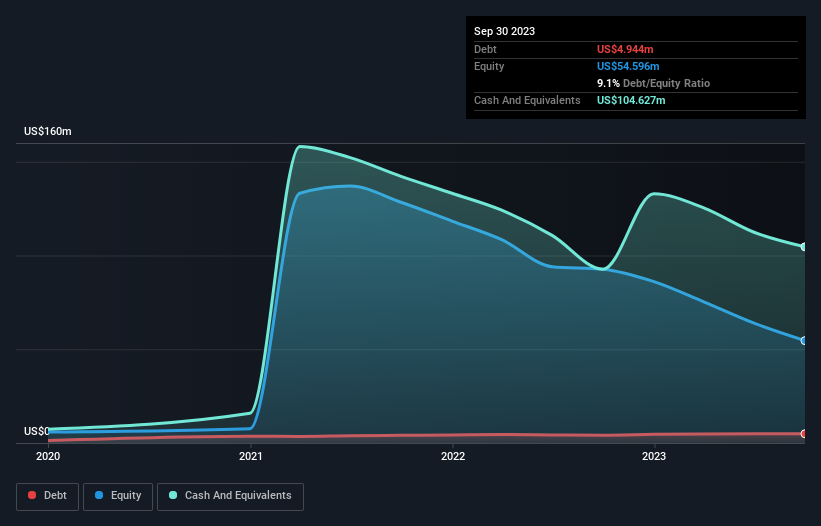- United States
- /
- Biotech
- /
- NasdaqGS:LVTX
LAVA Therapeutics (NASDAQ:LVTX) Has Debt But No Earnings; Should You Worry?

Legendary fund manager Li Lu (who Charlie Munger backed) once said, 'The biggest investment risk is not the volatility of prices, but whether you will suffer a permanent loss of capital.' When we think about how risky a company is, we always like to look at its use of debt, since debt overload can lead to ruin. We note that LAVA Therapeutics N.V. (NASDAQ:LVTX) does have debt on its balance sheet. But is this debt a concern to shareholders?
When Is Debt A Problem?
Debt assists a business until the business has trouble paying it off, either with new capital or with free cash flow. If things get really bad, the lenders can take control of the business. However, a more common (but still painful) scenario is that it has to raise new equity capital at a low price, thus permanently diluting shareholders. Of course, plenty of companies use debt to fund growth, without any negative consequences. When we examine debt levels, we first consider both cash and debt levels, together.
See our latest analysis for LAVA Therapeutics
What Is LAVA Therapeutics's Net Debt?
As you can see below, at the end of September 2023, LAVA Therapeutics had US$4.94m of debt, up from US$4.17m a year ago. Click the image for more detail. But on the other hand it also has US$104.6m in cash, leading to a US$99.7m net cash position.

How Healthy Is LAVA Therapeutics' Balance Sheet?
Zooming in on the latest balance sheet data, we can see that LAVA Therapeutics had liabilities of US$20.8m due within 12 months and liabilities of US$35.7m due beyond that. On the other hand, it had cash of US$104.6m and US$1.38m worth of receivables due within a year. So it can boast US$49.6m more liquid assets than total liabilities.
This surplus strongly suggests that LAVA Therapeutics has a rock-solid balance sheet (and the debt is of no concern whatsoever). Having regard to this fact, we think its balance sheet is as strong as an ox. Succinctly put, LAVA Therapeutics boasts net cash, so it's fair to say it does not have a heavy debt load! The balance sheet is clearly the area to focus on when you are analysing debt. But ultimately the future profitability of the business will decide if LAVA Therapeutics can strengthen its balance sheet over time. So if you want to see what the professionals think, you might find this free report on analyst profit forecasts to be interesting.
In the last year LAVA Therapeutics had a loss before interest and tax, and actually shrunk its revenue by 49%, to US$9.1m. To be frank that doesn't bode well.
So How Risky Is LAVA Therapeutics?
Although LAVA Therapeutics had an earnings before interest and tax (EBIT) loss over the last twelve months, it generated positive free cash flow of US$5.9m. So taking that on face value, and considering the net cash situation, we don't think that the stock is too risky in the near term. There's no doubt the next few years will be crucial to how the business matures. There's no doubt that we learn most about debt from the balance sheet. But ultimately, every company can contain risks that exist outside of the balance sheet. Case in point: We've spotted 4 warning signs for LAVA Therapeutics you should be aware of, and 2 of them make us uncomfortable.
If you're interested in investing in businesses that can grow profits without the burden of debt, then check out this free list of growing businesses that have net cash on the balance sheet.
New: AI Stock Screener & Alerts
Our new AI Stock Screener scans the market every day to uncover opportunities.
• Dividend Powerhouses (3%+ Yield)
• Undervalued Small Caps with Insider Buying
• High growth Tech and AI Companies
Or build your own from over 50 metrics.
Have feedback on this article? Concerned about the content? Get in touch with us directly. Alternatively, email editorial-team (at) simplywallst.com.
This article by Simply Wall St is general in nature. We provide commentary based on historical data and analyst forecasts only using an unbiased methodology and our articles are not intended to be financial advice. It does not constitute a recommendation to buy or sell any stock, and does not take account of your objectives, or your financial situation. We aim to bring you long-term focused analysis driven by fundamental data. Note that our analysis may not factor in the latest price-sensitive company announcements or qualitative material. Simply Wall St has no position in any stocks mentioned.
About NasdaqGS:LVTX
LAVA Therapeutics
A clinical-stage immuno-oncology company, focuses on developing cancer treatments.
Excellent balance sheet slight.


